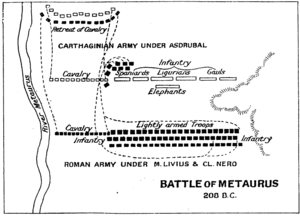Battle of the Metaurus
Without Hasdrubal's army to support him, Hannibal was compelled to evacuate pro-Carthaginian towns in much of southern Italy in the face of Roman pressure and withdraw to Bruttium, where he would remain for the next four years.
Rome was still reeling from the series of devastating defeats by Hannibal ten years earlier, and the Romans were terrified at the prospect of fighting two sons of "the Thunderbolt" (a rough translation of Hamilcar Barca's surname) at once.
Claudius Nero's force of over 40,000 men was too formidable for Hannibal to engage openly[citation needed], and so the two played an unproductive game of cat and mouse in Bruttium; meanwhile, Marcus Livius, despite the added bulwark of two of the many Roman armies scattered across Italy, yielded cautiously to Hasdrubal, and allowed him to push beyond the Metaurus as far south as the town of Sena, today Senigallia.
Recognizing the urgency of the situation and the enormous threat that a merging of the Carthaginian brothers' armies would present to Rome, Nero decided to circumvent the authority of the Senate, also advising them to organize levies for their own protection.
Leaving his camp under the command of his legate Quintus Catius, he then marched quickly to the North with 7,000 selected men, 1,000 of whom were cavalry, in order to join up with Marcus Livius.
When nightfall came, Hasdrubal quietly led his army out of his camp with the intent of retreating into Gaul, where he could safely establish communications with Hannibal.
Early on in the march, Hasdrubal's guides betrayed him, and left him lost and confused along the banks of the Metaurus, searching futilely for a ford at which to cross.
The night passed with no change in Hasdrubal's misfortunes, and the morning found his army disarrayed, deprived of sleep, and trapped against the banks of the Metaurus, with a great many of his Gallic troops drunk.
[8] He had introduced an innovation in elephant warfare, equipping their mahouts with hammers and chisels to kill the beasts if they ever turned against their own troops, as it was frequent.
The Carthaginian right wing and centre held their ground and the war elephants succeeded in breaking the Roman lines and spreading mass confusion.
Claudius Nero, on the Roman right flank, struggled to overcome the terrain that blocked his path to the unwary Gauls on Hasdrubal's left.
[8] The Carthaginian right wing, composed of Hispanics, could not withstand this two pronged attack of Marcus Livius from the front and Claudius Nero on their flank.
[8] Hasdrubal fought alongside his men and exhorted them to keep fighting, rallying fleeing soldiers and re-starting the battle wherever he was present.
The Gauls on the Carthaginian left now faced a three pronged attack: Porcius Licinius from the front, Marcus Livius from their right flank, and Claudius Nero from the rear.
[8] Hasdrubal, seeing that there was nothing more he could do, and presumably doubtful of his own prospects of escape or simply unwilling to be taken captive, charged into the Roman ranks on his horse along with his remnant Hispanic guards and was killed.
[10] Dexter Hoyos believes Hasdrubal's death was foolish, as he could have given organisation and leadership to the remnants of the Carthaginian army and posed a lingering threat to Rome in northern Italy.
[10] An unknown number of Ligurians and Gauls, possibly 10,000 or so, who either escaped the battle or didn't take part at all formed into an organised body but dispersed afterwards for want of a general.
[10] At least one Carthaginian officer, Hamilcar, refused to give up after Hasdrubal's defeat and organized a Cisalpine Gallic army of 40,000 men against the Romans in 200 BC, causing the Battle of Cremona.
It is included in Edward Shepherd Creasy's The Fifteen Decisive Battles of the World (1851), the rationale being that it effectively removed the Carthaginian threat from Rome's ascendancy to continental dominion by leaving Hannibal stranded in Italy.
Paul K. Davis sees its importance as the "Carthaginian defeat ended the attempt to reinforce Hannibal, dooming his effort in Italy, and Rome was able to establish dominance over Spain.
Nonetheless, the effects of Claudius Nero and Marcus Livius' victory at the Metaurus have earned it a significant standing amongst historians; not only of the history of Rome, but in that of the entire world.

